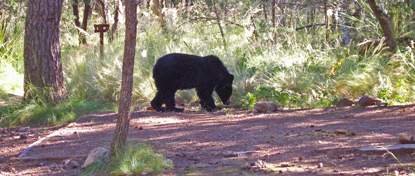|
You are viewing ARCHIVED content published online before January 20, 2025.
Please note that this content is NOT UPDATED, and links may not work. For current information,
visit https://www.nps.gov/aboutus/news/index.htm.

NPS
No visitor has ever been attacked or hurt by a black bear at Big Bend. Recommendation: Leave shoes outside tents or in bear boxes if camping in High Chisos backcountry sites. In December, a black bear destroyed 3 unoccupied tents in the Colima Canyon area of the High Chisos (above 7,000 feet). In February and March bears were again reported hanging around campsites in the Boot and Colima Canyon areas, increasing the risk for a human/bear encounter. These events occurred in solitary high mountain backcountry campsites, not in the developed Chisos Basin campground. According to the campers, food was not left in any of the tents. Apparently it was the smell of shoes that attracted the bear. The bear crushes or rips into tents to get at the shoes. When campers returned to their site, they find that shoes are removed, chewed on, and dropped along the trail or in the woods. When leaving a site for a hike, please put scented items in the bear boxes. Shoes and boots might be best left outside of tents so that if a bear is curious about that particular odor, they can smell the shoe, satisfy their curiousity, and move on. Sometimes bears eat carrion, and perhaps the shoes had a very strong scent. The bear destroyed the tents because it smelled something in the tent and investigated. The fabric was an incidental obstacle between them and what they want to check out. Please remember that bears don't realize that tents cost people money, nor do bears have an understanding of private property, they are just innocently doing what they have done for millenia...act like bears and investigate smells for possible food. Remember too that bears have a much better sense of smell than humans, so while we can't smell some things, they can. Do your best to think like a bear as you secure your belongings. It is advised that campers flatten tents while on a day hike away from a High Chisos site to lessen the chance of property destruction. Because of our traditionally non-threatening behavior toward them, bears have largely lost their normal caution and fear of humans. The unfortunate consequence is that the bear may develop a taste for items we bring with us and try to intimidate us so they can get at our food, which can cause injury to people. Campsites Reopened Due to the decrease in bear sightings starting in late November, the campsites at Colima Canyon, Boot Canyon, Emory Peak and Toll Mountain have been reopened to camping for the time being. If incidents with bears increase, closures may be reinstituted and additional measures taken to discourage bears from entering sites. No visitor has ever been attacked by a bear at Big Bend National Park. There have been a few instances this year of bears mock-charging visitors, growling, or stomping their feet when people approach or surprise them. Read further for bear discouragement techniques. What might occur if bears develop a taste for human food is injuries to hikers if a bear wants what a person is carrying, or if a person gets between the bear and food, or property damage to tents. This will only come to pass if visitors are reckless in how they take care of the items they bring that might attract bears. This includes food, soaps, items with odors like lip balm, even trash and dirty dishes not properly secured. The NPS is asking hikers and campers to please follow the following guidelines if encountering bears. 1) You should not linger near or approach bears if they are feeding naturally or in a tree. Give the bears room and go around them. This is their home and we are guests in this park. 2) If the bear is lingering at your camp, or if the bear intentionally approaches you or anyone in your group, it is recommended that you run the bear off by making noise and throwing rocks/sticks toward it. Do not do things to make the bear mad like hitting it with sticks or rocks, charging the bear, or any aggressive act. Do not run away either. Be assertive. The goal is for bears to remember to be wary of us. 3) Hikers should not leave packs, food, trash, or any other attractants unattended at any time or for any reason. Bears that develop a taste for our food often become dangerous. The park's bears have not become habituated to human food and we want to keep it that way. They should be eating grubs and pine nuts. This will prevent dangerous bear-visitor encounters. It would be a tragic loss if rangers had to track down and kill a bear that became dependent on our food and began to display aggresively foraging behavior. 4) If left outside of a bear box, make sure your pack is empty and that all attractants the bear can smell are in a bearproof storage container, including things like toothpaste, sunscreen, lip balm, water bottles, even canned foods. If you spilled food in your pack or you know it has odors that might attract a bear, store it in a bear-proof box. If it won't fit, empty it entirely and leave all pockets unzipped and open. 5) Please report sightings, incidents (particularly bears that exhibit aggressive behavior), and any property damage to a ranger at the visitor center, including filling out a wildlife observation report at a visitor center. |
Last updated: February 24, 2015
